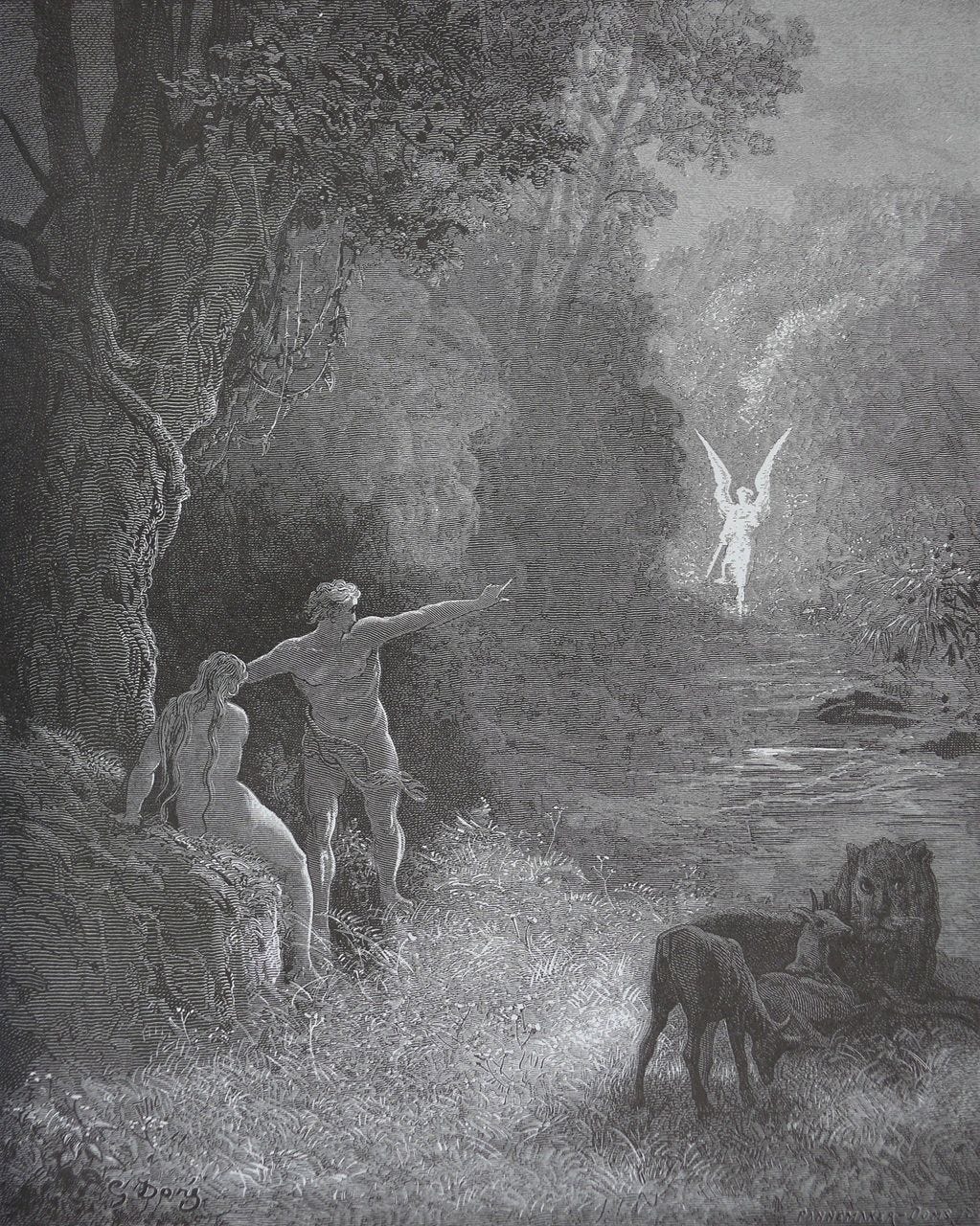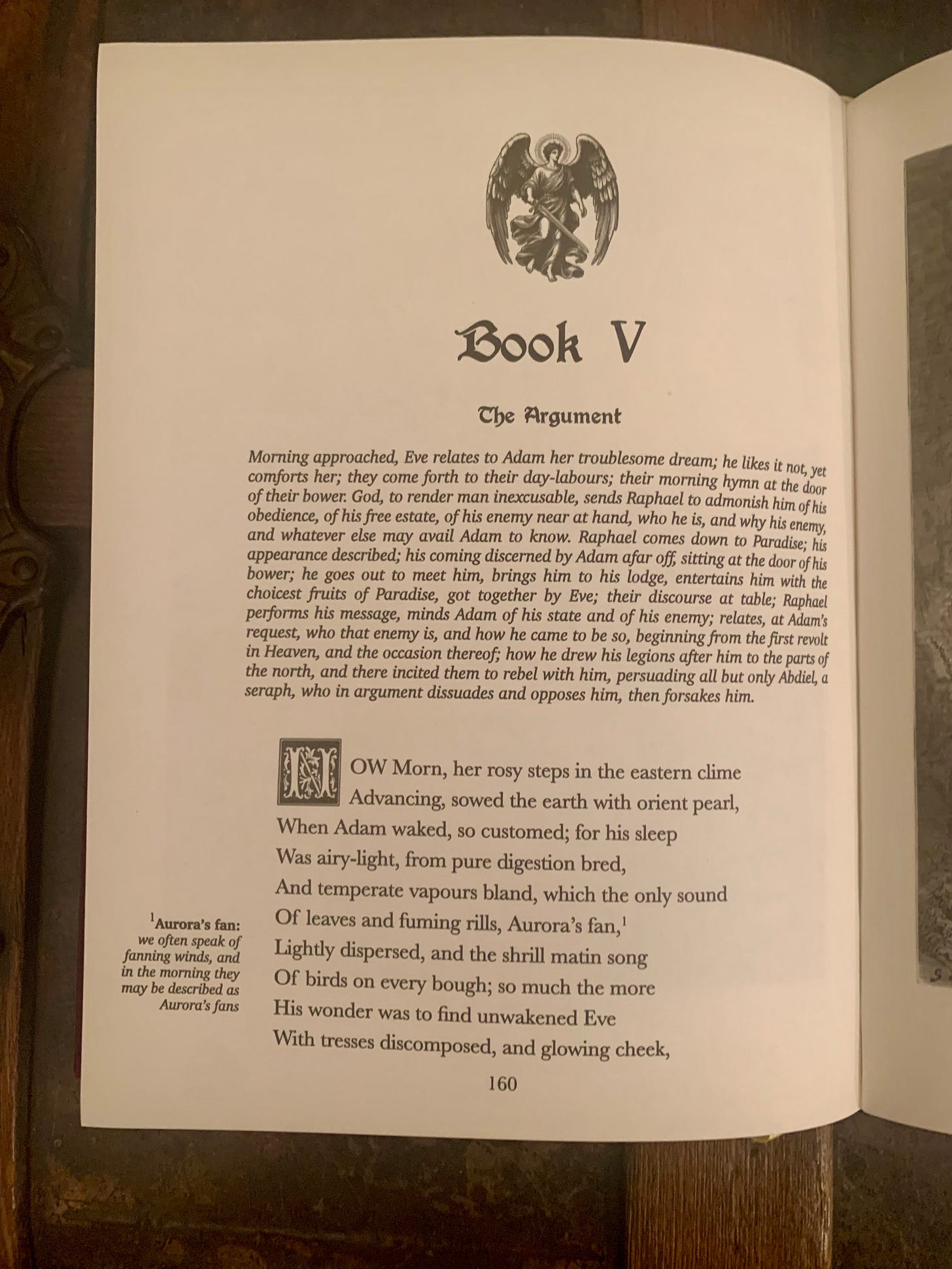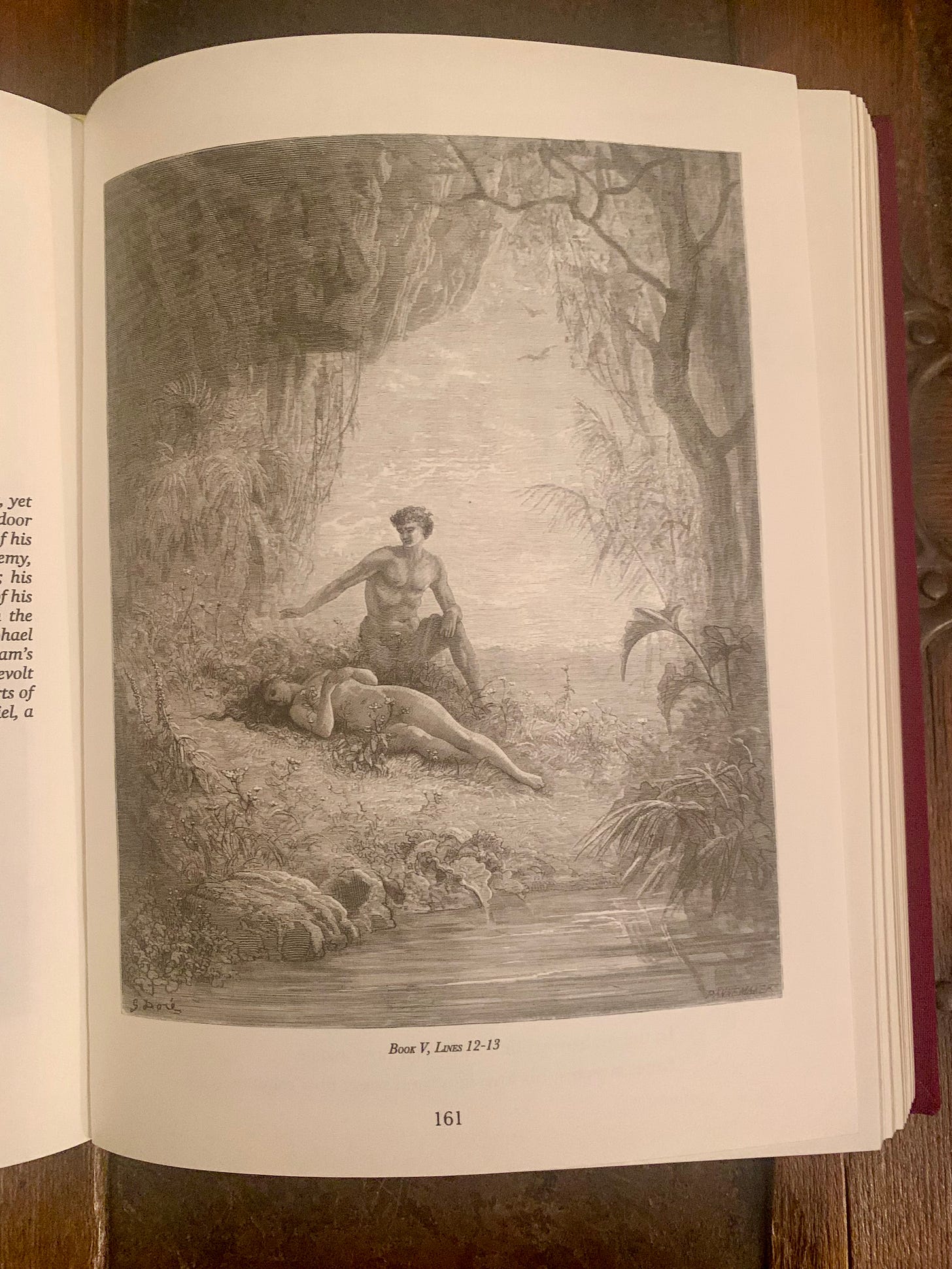In delving into Book 5, I want to take an approach I’ve yet to take so far, and that is to center my discussion on one theme. One might identify several themes in this book: free will (of humans and angels), the nature of rebellion (Satan’s), the Great Chain of Being, and monism,1 just to name a few.
The theme I want to address is food. (I do love food!)
But before getting to what I find to be a fascinating theme in Book 5, I need to talk a little bit about typology. A type is a kind of figure (like metaphor, simile, and other figures of speech). Specifically, it is a kind of symbol. A symbol is something that has two levels of meaning—a direct, literal meaning and a meaning that points to or represents something else. The cross, for example, depicts both an ancient form of execution and symbolizes the Christian religion (which, in turn, symbolizes various things, depending on your perspective). A type is a prophetic symbol, one that foreshadows something that is to come. In biblical hermeneutics, Adam is seen as a type of Christ. He is both himself (Adam) and he foreshadows the Son of Man to come. Noah’s ark is a type of the church. The flood is a type of the waters of baptism. Eve is a type of Mary (“blest Marie, second Eve” [5.387]). In each of these, the first both symbolizes and foreshadows its fulfillment to come.
Book 5 contains an abundance of imagery around food and eating. Some of it is just that, imagery. When anything in a literary work is repeated enough and appears in significant enough places, it becomes a theme. And that includes mere imagery. But some of the food in these lines (and the eating, etc. that accompanies it) symbolizes and predicts food, tasting, and eating that will come. There is so much food in Book 5 that it is, I think, a central theme (one that is, of course, interwoven throughout the entirety of Paradise Lost, which makes sense given the central role played by forbidden fruit).
The theme emerges early on when we learn in the opening lines of Book 5 that Adam awakens from an airy, light sleep, customary for him because of his “pure digestion” (5.4). The note in the Riverside edition explains that Adam’s unfallen body eats in moderation food from a yet-to-be cursed ground, so his bodily “vapors” (gasses) are but mild (5.6). Milton really does try to imagine all of our bodily functions (or most) in their pre-fallen state! (Shoutout to Paul N here in regard to last week’s comments!)
Next Eve relays to Adam the dream Satan caused her to have foreshadowing her eating of the forbidden fruit. In the dream, not only does he tempt her to eat the fruit from the tree “surcharged” (5.59), in other words overgrowing with abundant fruit, but in the dream Satan himself boldly “plucked, tasted” (5.65). Foreshadowing, indeed.
Then comes the main course of food imagery in this book. This is the meal Adam and Eve share with the visiting angel Raphael, who has been sent by God to remind Adam that God gave him (and Eve) free will to obey him. Adam and Eve treat the noble, majestic angel with utmost hospitality.
First, Adam instructs Eve to go to their stores of food and to “bring forth and pour abundance” (5.314-15) on their guest. Then follows an interesting description from Eve of the way they harvest, keep, and store their food with frugality and in season:
Adam, earth’s hallowed mould,
Of God inspired! small store will serve, where store,
All seasons, ripe for use hangs on the stalk;
Save what by frugal storing firmness gains
To nourish, and superfluous moist consumes:
But I will haste, and from each bough and brake,
Each plant and juciest gourd, will pluck such choice
To entertain our Angel-guest, as he
Beholding shall confess, that here on Earth
God hath dispensed his bounties as in Heaven. (5.321-30)
We see over and over, in various ways, that the virtue of temperance is natural in the unfallen state. In the midst of the abundance of Paradise, there is no hoarding or wasting or greed. What a lesson for those of us who seek a bit more of paradise on earth here and now!
Then comes a long description of the choice food—fruit, juice, meads— “whatever Earth all-bearing Mother yields” (5.338)—served on a grassy table surrounded by moss-covered seats (5.391-92). It is the mother of all charcuterie boards!
Yet, like any humble host, Adam assumes their food will be “unsavory” to one of a spiritual nature such as Raphael (5.397-403). But to Adam’s surprise (and all of ours, I think I can safely assume), Raphael—after explaining that all creatures and created things share the same spiritual and material makeup, merely in different proportions—fell “with keen dispatch of real hunger” (5.433-39) upon the feast. Angels eat! (Spoiler alert: in a later book, Adam will ask Raphael if angels have sex. You won’t believe what happens next!)
Upon Adam’s asking Raphael to explain to him the things the angels experience in heaven (particularly around the rebellion led by Satan), Raphael expresses just how difficult such a task is. Raphael explains that he will have to use metaphors to relate to Adam spiritual things in material forms. This is another way that types (and all kinds of figures of speech) work.
… O prime of men,
Sad task and hard: For how shall I relate
To human sense the invisible exploits
Of warring Spirits? how, without remorse,
The ruin of so many glorious once
And perfect while they stood? how last unfold
The secrets of another world, perhaps
Not lawful to reveal? yet for thy good
This is dispensed; and what surmounts the reach
Of human sense, I shall delineate so,
By likening spiritual to corporal forms,
As may express them best; though what if Earth
Be but a shadow of Heaven, and things therein
Each to other like, more than on earth is thought? (5.563-76)
C. S. Lewis’s commentary on the angels in A Preface to Paradise Lost is most helpful. Lewis describes how the great eighteenth century critic Samuel Johnson assumed that Milton’s description of the angels in Paradise Lost as corporeal (material) beings was merely a poetic device. Lewis explains, however, that “Milton’s picture of the angels, though doubtless poetical in detail, is meant in principle as a literally true picture of what they probably were according to the up-to-date pneumatology of the time.” The Platonic theology that influenced Milton (in contrast to the scholasticism of Aquinas) “believed all created spirits to be corporeal.” Belief in the corporeality of spirits meant that angels would hunger and thirst. The description of Raphael sitting and eating with Adam and Eve, Lewis writes, “becomes intelligible, and much less poetically grotesque, when we realize that Milton put it there chiefly because,” like many others, “he thought it true.”2
Angels in the Bible take different appearances, but in some cases they appeared as humans. Raphael appears both as an angel (with six wings, according to lines 277 and following), and in human enough form to sit and eat.

Pure spirits such as angels, Raphael explains, share the “lower faculties” with humans whereby angels can “hear, see, smell, touch, taste … digest, assimilate, and “corporeal to incorporeal turn” (5.10-13). In other words, angel digestion entails turning matter into spirit (I think …).
After their dinner, Raphael describes to Adam the angels feasting in heaven following God’s announcement that he had begotten a Son3 (the announcement of which led to Satan’s rebellion). The metaphors Raphael uses to describe their food and drink evoke the richness, preciousness, and eternal nature of a spiritual experience in material terms:
Tables are set, and on a sudden piled
With Angels food, and rubied nectar flows
In pearl, in diamond, and massy gold,
Fruit of delicious vines, the growth of Heaven.
On flowers reposed, and with fresh flowerets crowned,
They eat, they drink, and in communion sweet
Quaff immortality and joy, secure
Of surfeit, where full measure only bounds
Excess,4 before the all-bounteous King, who showered
With copious hand, rejoicing in their joy. (5.632-41)
Particularly notable here is Raphael’s use of the word “communion.” It appears just after the existence of Christ has been made known to them. And this is the greatest type of all: communion at the dinner table is a foreshadowing of communion around the body and blood of Christ. The fruit Eve ate in disobedience foreshadows the fruit of the Spirit with which we are filled by partaking of Christ’s obedience at the cross.
Readers, there was so much I didn’t get to here! Please comment, add, question, and point out all the other things in the comments!
Next up: Book 6
Planning ahead: I am overjoyed at the way our slow read of this work has been going. I can’t believe we are almost halfway through! It may seem early to plan this far ahead, but I’d love to start gauging interest for the future. For those of you who have joined only recently, the context for this entire newsletter has been a very, very slow survey of English literature. We began with Beowulf, and here we are in the seventeenth century. All of this literature we are reading is wonderful. But there is, I think, even more depth and richness when we read such literature in chronological order, within literary and historical context. So I do plan to continue that plan. A long work that would be next in order would be John Bunyan’s The Pilgrim’s Progress. Would you be interested in reading that together? I’d be happy to write about some shorter works in between or give some other sort of break. Please let me know. My own periods of expertise are the eighteenth and nineteenth centuries, and while I can’t wait to get there, I do feel we have all the time in the world. I’m in no hurry. Indeed, avoiding hurry is exactly why I’m here.
"Absolutely unmixed attention is prayer.”5
***
BOOK NOTE:
This week’s book note is “breaking news”! This book arrived unexpectedly in the mail today (after I’d recorded the above), so this note is not included in the audio. But I could not wait to share it with you! This is a new Lithos Kids edition of Paradise Lost and it is gorgeous! It features a beautiful and readable font, gilded pages, and classic illustrations. Just look! I will post more about this edition next week.
This is way beyond my paygrade, but the type of monism that seems to be described in Paradise Lost is the idea that all creation comes from one substance but merely exists in different proportions. Here’s an interesting, deeper dive into the way the poem expresses this philosophy.
C. S. Lewis, A Preface to Paradise Lost (HarperOne, 1942), 135-37.
Again we see Milton’s heterodox view regarding the Trinity.
Moderation again!
Simone Weil, Gravity and Grace, trans. By Emma Crawford and Mario von der Ruhr (London: Routledge, 2002), 117.








Jack's comment about this being a poetic composition (agreed!) ought to remind us that Milton is not writing a theological treatise but an imaginative work intended to speak to sin and redemption, God's sovereignty and authority and his plan for the salvation of his creation after the fall. Whatever Milton's theology of the Trinity, I think it's more interesting to contrast the "begotten" nature of creation with Satan's boast in lines 853 and following:
"That we were formed then say'st thou? and the work
Of secondary hands, by task transferred
From Father to his Son? strange point and new!
Doctrine which we would know whence learnt: who saw
When this creation was? remember'st thou
Thy making, while the Maker gave thee being?
We know no time when we were not as now;
Know none before us; self-begot, self-raised
By our own quick'ning power, ...
Our puissance is our own, our own right hand
Shall teach us highest deeds...."
The ultimate folly of Satan and men is to deny that God has any authority over creation and us by claiming that all we are and possess is owed solely to our own strength and wisdom and wit. And here is Satan doing just that. He is self-begot, or in the modern vernacular, he is a self-made man.
Holly, you beat me to this point! I was slightly annoyed with Milton for having Eve do all of the "kitchen work" especially since it seems that they worked together rather equally in the garden. The "second shift" indeed.
I also thought of Jesus' words to Mary when she listened to him teach instead doing the serving work like Martha.